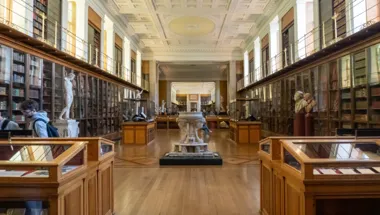The Distributed Artificial Intelligence group explores social and technological contexts of interacting intelligent entities, including multi-agent systems, agent-based simulation, crowd computing, semantic web, provenance, norms, incentives, knowledge graphs, trust and reputation.
The group marries artificial intelligence expertise with social, political and economic theories and data to pursue research that has strong technological and societal relevance and benefit. We take inspiration from tools and techniques in human societies for the engineering of effective decentralised technology and responsible AI, and develop computational models for analysing social, political and economic phenomena to improve the effectiveness and fairness of policy and practice and to build socio-technical systems that combine machine algorithms with human and social capabilities.
PhD opportunities
We offer an exciting research environment where PhD students can pursue their own projects in a variety of fields including cyber security. The Department of Informatics invites applications for postgraduate research students for funded and self-funded projects starting in October each year.
Projects

Wikidata Quality Toolkit
Dr Albert Meroño Peñuela is part of an EPSRC IAA project with Wikidata, one of the world’s most precious data assets. Launched in 2012 by the Wikimedia Foundation (the NGO that runs Wikipedia), it is a database containing machine-readable factual information about 100+ million topics. The team will build a Wikidata Quality Toolkit, which will support a diverse set of editors in curating and validating Wikidata records at scale. This will leverage research findings and conceptual prototypes drawing from AI, data management, and social computing, which have been designed and evaluated by the Wikidata community, responding to their data assurance needs.

EPSRC New Investigator Award - Dr Bart De Keijzer
Dr Bart De Keijzer's project aims to investigate the notion of simplicity in the design of market mechanisms. The proposal is on market mechanism design and their effective and practical implementation. The project will study how these platforms should operate to align with the incentives of the agents and maximise efficiency. The potential applications of this work include in online advertising auctions, online marketplaces, and platforms such as Uber and AirBnb

MuseIT
Dr Albert Meroño Peñuela is part of MuseIT, an EU co-funded project which aims to co-design, develop, and co-evaluate a multisensory, user-centred platform for enriched engagement with cultural assets, with inclusion and equal opportunity for all as core principles. Participatory co-design activities are integral to the project, enabling users with disabilities to be involved in decisions and designs. The MuseIT consortium comprises nine partners from European Union member countries and 2 associated partners, from the USA and the United Kingdom. This multidisciplinary consortium brings together organisations from cultural, technological, research and user communities.

Polifonia Horizon 2020 project
Dr Albert Meroño Peñuela was part of a €3 million project funded by the EU Horizon 2020 Programme, that ran from January 2021 until April 2024 to recreate the connections between music, people, places and events from the sixteenth century to the modern day. The findings include a knowledge graph that helps enhance our understanding of European musical heritage. The Polifonia consortium is an interdisciplinary team of passionate researchers and music lovers: computer scientists, anthropologists and ethnomusicologists, historians of music, linguists, musical heritage archivists, cataloguers and administrators, and creative professionals.
Additional Projects
Publications
News
King's to build AI tool for teachers as part of government's AI drive
The Department for Education is funding Professor Yulan He to develop an AI assessment and learning tool

King's researcher partners with AI start-up to build natural language generation models
The models aim to remove 'hallucinations' from AI-generated language.

King's creates world's first podcast musical about AI
The production takes aim at ChatGPT to teach the principles of data education through song.

Specialised badges help people with invisible disabilities speak up
New customisable digital badges will help people with invisible disabilities sidestep social stigma in public.

Three King's scientists win prestigious New Investigator Awards
Three King’s academics have been awarded funding from EPSRC to establish research groups.

Seminar series
We hold weekly seminars in term time, with speakers internal and external to King's discussing diverse research topics on distributed artificial intelligence.
Please explore the seminar web page for upcoming and previous events.
Projects

Wikidata Quality Toolkit
Dr Albert Meroño Peñuela is part of an EPSRC IAA project with Wikidata, one of the world’s most precious data assets. Launched in 2012 by the Wikimedia Foundation (the NGO that runs Wikipedia), it is a database containing machine-readable factual information about 100+ million topics. The team will build a Wikidata Quality Toolkit, which will support a diverse set of editors in curating and validating Wikidata records at scale. This will leverage research findings and conceptual prototypes drawing from AI, data management, and social computing, which have been designed and evaluated by the Wikidata community, responding to their data assurance needs.

EPSRC New Investigator Award - Dr Bart De Keijzer
Dr Bart De Keijzer's project aims to investigate the notion of simplicity in the design of market mechanisms. The proposal is on market mechanism design and their effective and practical implementation. The project will study how these platforms should operate to align with the incentives of the agents and maximise efficiency. The potential applications of this work include in online advertising auctions, online marketplaces, and platforms such as Uber and AirBnb

MuseIT
Dr Albert Meroño Peñuela is part of MuseIT, an EU co-funded project which aims to co-design, develop, and co-evaluate a multisensory, user-centred platform for enriched engagement with cultural assets, with inclusion and equal opportunity for all as core principles. Participatory co-design activities are integral to the project, enabling users with disabilities to be involved in decisions and designs. The MuseIT consortium comprises nine partners from European Union member countries and 2 associated partners, from the USA and the United Kingdom. This multidisciplinary consortium brings together organisations from cultural, technological, research and user communities.

Polifonia Horizon 2020 project
Dr Albert Meroño Peñuela was part of a €3 million project funded by the EU Horizon 2020 Programme, that ran from January 2021 until April 2024 to recreate the connections between music, people, places and events from the sixteenth century to the modern day. The findings include a knowledge graph that helps enhance our understanding of European musical heritage. The Polifonia consortium is an interdisciplinary team of passionate researchers and music lovers: computer scientists, anthropologists and ethnomusicologists, historians of music, linguists, musical heritage archivists, cataloguers and administrators, and creative professionals.
Additional Projects
Publications
News
King's to build AI tool for teachers as part of government's AI drive
The Department for Education is funding Professor Yulan He to develop an AI assessment and learning tool

King's researcher partners with AI start-up to build natural language generation models
The models aim to remove 'hallucinations' from AI-generated language.

King's creates world's first podcast musical about AI
The production takes aim at ChatGPT to teach the principles of data education through song.

Specialised badges help people with invisible disabilities speak up
New customisable digital badges will help people with invisible disabilities sidestep social stigma in public.

Three King's scientists win prestigious New Investigator Awards
Three King’s academics have been awarded funding from EPSRC to establish research groups.

Seminar series
We hold weekly seminars in term time, with speakers internal and external to King's discussing diverse research topics on distributed artificial intelligence.
Please explore the seminar web page for upcoming and previous events.





